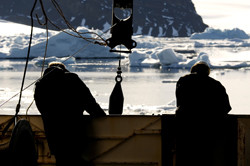Polar research vessel to be developed
Changes affecting the global climate and environment will have significant impacts on humanity. The polar regions are of particular interest to scientists because it these areas that respond fastest and most dramatically to global warming. The 'European polar research ice breaker consortium Aurora Borealis' (ERICON-AB)(opens in new window) project called for construction of a unique research vessel. It had to be a combination of heavy icebreaker, deep-sea drilling ship and multi-purpose research vessel. It also had to be capable of operating unsupported in the pack ice of the Arctic and Antarctic, as well as in open water, in all seasons. Known as the Aurora Borealis, the ship will be able to navigate in sea ice thicker than 2.5 m. It will also be able to drill in seas between 100 and 5 000 m in depth, penetrating more than 1 000 m into the seabed. In addition, such demanding conditions require an innovative, high-performance dynamic positioning system to keep the vessel in position. Research conducted on board the ship will investigate climate change by collecting physical, biological, geological and chemical data. Biodiversity assessments, geohazard analyses and resource engineering studies will also be conducted. It will also improve analysis and understanding of natural resources and northern sea routes and the mapping of gas hydrates and submarine permafrost distributions. In addition, new technologies will be tested. ERICON-AB generated the strategic, legal, financial and organisational frameworks required to commit the necessary resources for constructing and running the Aurora Borealis. A scientific management framework was also assessed, which includes mechanisms for coordinating large-scale long-term research or special mission specific research programmes. The consortium focused on advancing the project from preparatory phase to construction phase by overcoming key obstacles. These included barriers to engineering financial models to enable mixed participation of EU Member States and non-EU partner countries. ERICON-AB results will help to ensure that the Aurora Borealis is successfully developed. The final result will be a research icebreaker capable of conducting complex interdisciplinary experiments and data collection. This unique vessel will therefore provide a vital contribution to science and the fight against climate change.







